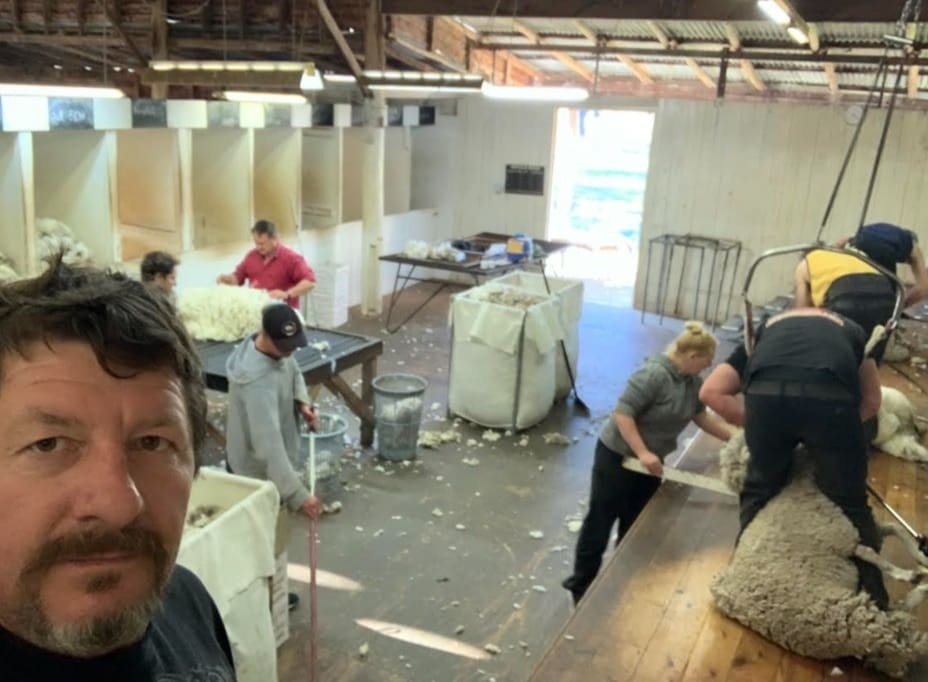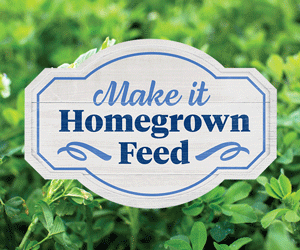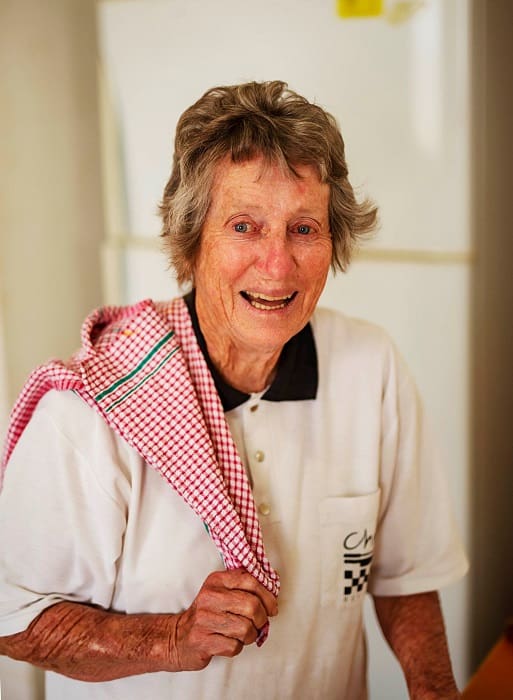
Queensland-based shearing contractor Geoff Cullen with his team working in Queensland.
RESTRICTIONS on shearing teams crossing the Queensland-New South Wales border have increased the prospect of sheep welfare issues as COVID-19 lockdowns coincide with lambing and ideal flystrike conditions.
Although under current border rules, shearing teams are recognised as essential workers in New South Wales, shearing is now not deemed an essential activity in Queensland under border crossing rules.
Shearing and other workers are required to have had at least one COVID-19 vaccination and must apply for an exemption to cross the border north.
Shearing Contractors Association of Australia secretary Jason Letchford said the Queensland-New South Wales border restrictions are stopping teams from crossing the border.
Mr Letchford said Queensland needs southern workers for shearing and harvesting, but NSW workers crossing the border to work could face fines of up to $13,000 if they don’t follow the border rules.
Workers applying for an exemption to work in Queensland must be vaccinated at least once and demonstrate why the services are needed and cannot be obtained in Queensland, why they must be provided without delay and why the worker’s physical presence is needed. The employer must also have a quarantine management plan that complies with the form approved by the Chief Health Officer (DOCX).
 Mr Letchford said the restrictions also apply to NSW workers who reside in the NSW-Queensland border regions.
Mr Letchford said the restrictions also apply to NSW workers who reside in the NSW-Queensland border regions.
“The same applies for Queensland border region workers who enter the NSW border region, who will need an exemption to return home.”
The SCAA along with WoolProducers Australia, Australian Wool Innovation and Agforce Queensland are working to have this changed but there are certainly no guarantees, he said.
Mr Letchford said it is going to be essential at some point in the season for shearing and other workers to cross the border to harvest wool, maintain animal welfare and to maintain farmers’ livelihoods.
“We need to find a workable solution otherwise we are in dire straits in this regard.”
Mr Letchford said the SCAA was assisting members to get their workers vaccinated, but was aware workers would weigh up the isolation delays in returning to work if they sought COVID-19 testing.
Queensland contractor forced to give up NSW sheds

Cullen team cook Daphney Moore has been sidelined by the COVID-19 border restrictions.
Queensland contractors Geoff and Jacqui Cullen are based at Karara in the south-east, but their run includes several border sheds in northern New South Wales that are now facing delays to their normal shearing.
Jacqui Cullen said most of the business’ work is on the southern side of the border and has been “flat strap” trying to get workers during the current industry shortage. The new requirements have dissuaded one fully vaccinated shearer who lives in NSW from coming into Queensland to work. Other shearers living in Queensland were supposed to be working in NSW next week, but have balked at the requirement to get vaccinated before returning and quarantining afterward.
“I’m super agitated, after going through the drought and everything else we’ve been through,” she said.
“Most of our sheds are on the other side of the border (in NSW) and we don’t even go through towns to get to them.”
Jacqui said the restrictions had also affected an 84 year-old shearers’ cook Daphney Moore who does not want to get vaccinated.
“We have had to effectively retire her because we have been told vaccinate all your staff or it will be your liability – it’s wrong.”
Contractor Geoff Cullen said although his workers could cross into NSW to work, the Queensland re-entry rules for his unvaccinated workers has forced him to try to get other contractors to do his NSW sheds.
“We could go over there (to NSW), but we would all have to be vaccinated to come home and we would probably have to go into 14-day quarantine when we came back.
“The word is you won’t be able to get back into Queensland unless you’ve had one jab and then will be directed to hotel quarantine at your expense.”
Mr Letchford said there is no guarantee that a Queensland shearing industry worker entering New South Wales would be able to return to their home state without Chief Health Officer approval.
Mr Cullen said his workers were due to start at three NSW sheds with about 7500 sheep next week, and has had to get an Inverell contractor to do the jobs, though he won’t be able to start for a month.
“It’s getting really close to lambing and it is nearly becoming an animal welfare issue because if we can’t get it off them before they lamb then you can’t touch them for at least a month to six weeks afterward at a minimum.”
This could lead to the loss of ewes from flystrike and of lambs not being able to find the udder, he said.
There is not much shearing work in Queensland at the moment, and at least one of his Queensland-based workers has already applied for other jobs.
“It is hard enough now to keep staff as it is.”
Mr Cullen believes his team should be able to go straight to a NSW shed and not leave to return to Queensland until the work is finished.
“I can’t see how we can be dictated like that for work just across the border.”
Establish a border bubble for shearing
New South Wales Dohne breeder Scott Warby had been expecting the Cullen team in September to shear 3000 ewes and crutch June-July drop lambs on his property ‘Rosscommon’ just south of the Queensland border town Mungindi.
“If it doesn’t get done we are going to have a pretty serious fly problems.
“If you can’t shear your sheep, what do you do?” he said.
“I’m still on a 12 month shearing so they’ve got a pretty full fleece on them with the season.
“I said to Geoff maybe I’ll put all my sheep on a truck and send them over the river and he can send them back shorn.”
Mr Warby said a border bubble should be established.
“We don’t recognise the border except for three days of the year when the State of Origin is on, otherwise it’s just a river.
“Our (Mungindi) hospital is in Queensland and it’s shut down at the moment because the nurses aren’t allowed across the border.”
Mr Warby said recent flooding had meant “feeding sheep with a tinny for about a month as well,” with 70 ewes lambing on a four hectare island.
“We’ve still got sheep we can’t get to our yards because of flood water.
“So my sheep that need shearing are actually still stuck on the wrong side of the river and I’m hoping by this weekend we can cross them over a bridge.”
He recently left a motorbike needed for shearing and a hydraulic ban off a chaser bin for repair in Goondiwindi in Queensland and now can’t pick them up.
Another Cullen client, Shane Murphy, lives on ‘Goondoobluie’ between Mungindi and Collarenebri in the Walgett Shire in NSW, but has to go into Queensland to get to Mungindi.
“We were due to start shearing this week and we’ve got about 4500 to shear as a matter of urgency.
“Some have lambs but we want to turn them around for rejoining, but they have to have their fleece off and their lambs off them to do that.”
He said pregnancy toxaemia could become an issue if pregnant ewes were yarded for shearing too close to lambing. His best hope now was shearing in mid-September with the help of a friend of Geoff Cullen.
“It won’t be a day too soon, we probably can handle that, but with continued potential changing of rules and things we just hope that nothing sabotages that possibility.
“It will be critical by then to our business and to the welfare of the sheep,” he said.
“Everyone know what happened to the sheep population in Queensland through drought and dogs, so a lot of these shearers along the border rely on NSW and Queensland work.”
Mr Murphy said given that shearing teams could isolate themselves while working, their reliance on cross-border work, the worker shortage and animal welfare issues there should be some understanding from authorities. The declining effectiveness of flystrike chemicals is also a concern, with flies are already appearing in the Walgett area and strong indications of a wet summer.
“Most of them are lasting about half as long as they used to, so the only other tool against blowfly strike is get the wool off the sheep,” he said.
“We’ve had five years of drought in this area and now we are just trying to build our numbers back up and we get blindsided by this sort of stupidity.
“If it is going to be so stringent on them guys returning (to Queensland), what chance have they got to continue their work, they can’t.”
Mr Murphy said if shearing teams had an enforced hiatus due to the restrictions he advised workers to get vaccinated.
“It’s going to come to a point where either you have that little card with the two ticks on it – which I have – for the resumption of normal service, so I think it is in everyone’s best interest to get vaccinated.”
Clarity needed on border restrictions for wool workers
WoolProducers Australia chief executive officer Jo Hall said the peak grower body has been able to argue that shearing must be considered an essential operation and animal husbandry practice.
“It is concerning that Queensland doesn’t seem to have provided provisions for the entry of shearers into Queensland if and when the time comes that they are needed.”
“We strongly encourage vaccination for all wool harvesters and growers, because we really need to protect the pool of workers that we have,” she said.
“We learned from last year that without New Zealand labour coming in that there is likely to be a labour gap, so we need to look after the ones that we have, and one of the best ways to do that is through vaccination.”
Ms Hall said all states need to make it clear what restrictions and rules apply to wool and agricultural industry workers needing to cross borders.
“We just need clarity.”
Ag class exemption does not apply to shearers – QLD DAF
A Queensland Department of Agriculture and Fisheries spokesperson told Sheep Central the COVID-19 Delta variant is a significant risk to Queenslanders, with our border being one of the last lines of defence.
“One mistake could jeopardise the great work that our farming and agribusiness sector, together with all Queenslanders, have done to keep our communities safe, especially those in regional areas.
“The agricultural class exemption does not apply to shearers crossing the border from New South Wales to Queensland,” the spokesperson said.
“Queensland farmers or business owners looking to hire shearers can consider applying for an exemption that clearly demonstrates a number of things, including that they have seriously attempted to source workers from outside of hotspot areas and why this work is critical to the Queensland industry.
Applications can be made through the COVID-19 Services Portal – https://healthserviceportal.health.qld.gov.au/hdsp.”
“Regardless of any endorsement, you must not enter Queensland if you have; been to a COVID-19 interstate exposure venue or are a contact of someone who has symptoms consistent with COVID-19; have been diagnosed with COVID-19 or had known contact with a confirmed COVID-19 case; been issued a quarantine or other stay at home order or been tested for COVID-19 and are awaiting a test result, except for testing undertaken as part of a surveillance testing program.”
Queensland considers the whole of New South Wales as a hotspot. New South Wales border zone residents can only cross the border for an essential purpose. Likewise, Queensland residents can only enter the New South Wales border zone for an essential purpose. New South Wales border zone residents and Queensland residents who have travelled into the border zone must comply with stay at home and face mask requirements, while in Queensland.
Sheep Central has been told Queensland workers must register at https://www.nsw.gov.au/covid-19/rules/border-restrictions to travel into New South Wales, and while in NSW, must follow the state-wide stay-at-home rules that apply to regional NSW.
“Workers from other states should be aware of their requirements to return home to their state or territory,” a NSW Department of Primary Industries spokesperson said.
On Thursday, the lockdown in regional New South Wales was extended until at least September 10 as concerns about COVID-19 cases in western NSW continued.



There is also a big problem in Tenterfield and surrounding areas. There are dogs killing sheep and the main trapper lives on the Queensland side. If he comes into NSW he cannot go back. The authorities need to look at this urgently. This is animal welfare issue. In my area alone, I know of 50 kills. The powers to be need to act.